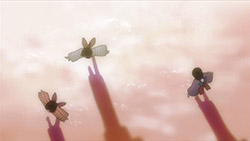 |
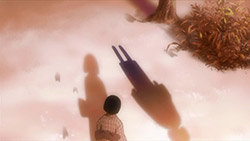 |
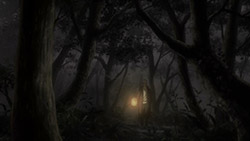 |
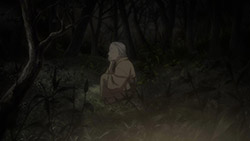 |
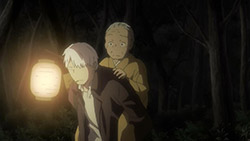 |
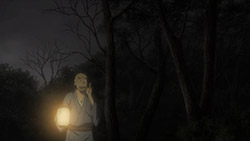 |
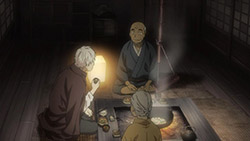 |
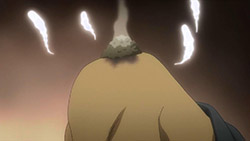 |
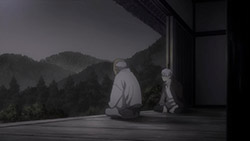 |
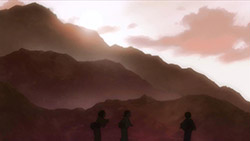 |
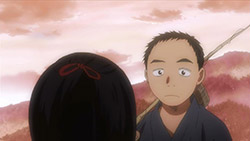 |
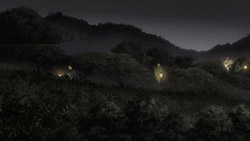 |
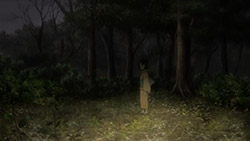 |
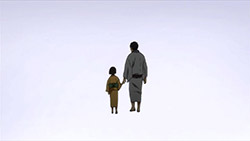 |
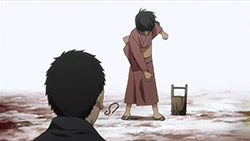 |
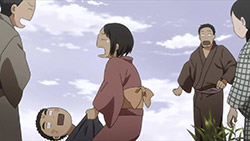 |
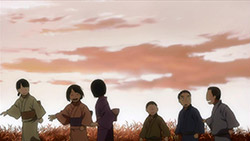 |
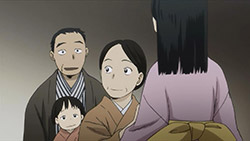 |
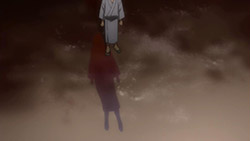 |
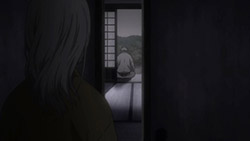 |
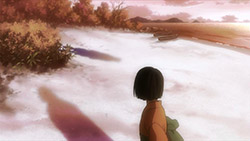 |
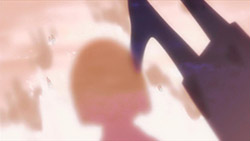 |
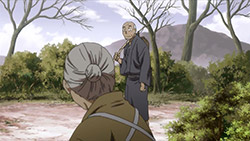 |
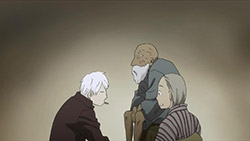 |
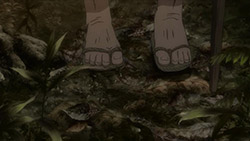 |
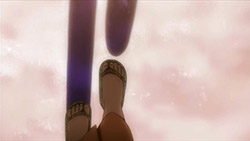 |
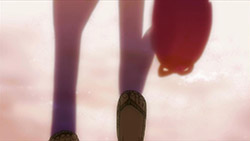 |
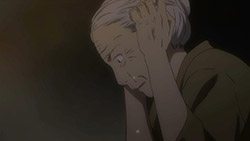 |
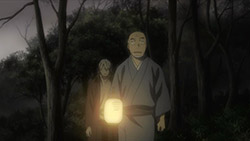 |
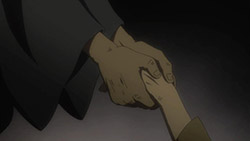 |
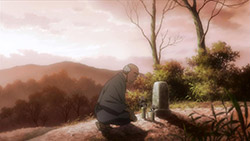 |
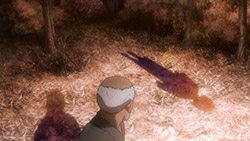 |
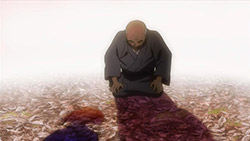 |
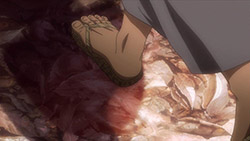 |
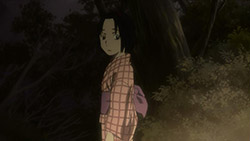 |
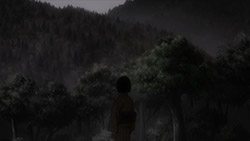 |
「残り紅」 (Nokori Beni)
“Lingering Crimson”
Another week, another episode about old couple generally satisfied with their lives. How many episodes about old people can we sustain? In Mushishi‘s case, the answer seems to be, ‘as many as necessary’. Lingering Crimson is essentially a companion piece to last week’s Fragrant Darkness. It’s also a story about the past and about regrets, but this time specifically about guilt.
In a different world, Mikage (Suzuki Reiko) would just be a senile old woman, and her husband Youkichi (Nishimura Tomomichi) jokingly calls her as much. Of course, in a world with mushi we can never just take things at face value (even if, sometimes, a bruise is just a bruise). It always strikes me, though, how little its inhabitants understand their own world. Upon finding a Mikage instead of an Akane, the villagers start to suspect that she’s the child of demons. I don’t expect education to be a thing in a subsistence society, but one would think handing down folktales about mushi would be more useful than tales about demons. The West, too, has tales of changelings and fey interferences, from a time when superstition was still our main means of understanding the world. Perhaps paranoia about demons is simply a necessary survival mechanic when being less apprehensive can get you killed. ‘Demons’, however, imply willful malevolence, some sort of directed malice against humans. That would, in turn, imply that they care about humanity. The mushi do not. They are essentially phenomena, gods with inscrutable whims. The world is simply cold to human misfortune.
The mushi of the week, the Oomagadoki, plays up the mushi as phenomena angle more than most. Nobody really knows exactly what it does, let alone why it does it. It just sometimes reaches into the human world and takes someone away. It’s notable how neither Mikage nor Youkichi ever actually blame the mushi for their situation. If mushi are merely phenomena, then it is the actions of human, stepping on shadows, that are the most telling. Mikage is the one who chooses to make a victim of Akane in her place, and Mikage is the one who feels the guilt. Yet, Youkichi also feels contrition, and it is Youkichi who finds a tragic sort of atonement. The greatest sin, Mikage feels, is that they she was happy. But who can really blame another for being, in their ignorance, happy? Youkichi forgives Mikage her happiness, but could not do so for himself. It’s almost as if Mikage passed on something to Youkichi as well, much like the curse of the Oomagadoki. Guilt casts a long shadow over many lives, and shadows are the longest at dusk. The Lingering Crimson is an offer of two choices: living in an eternal twilight with the Oomagadoki, or living in an eternal twilight with your sin. To simply forget the past, and remain unaware of its shadows, may be the only mercy we can be offered.
Full-length images: 10, 17, 36.
Preview
 |

This was one of my favorite episodes. Poor Akane. She spent decades alone, unable to step on anyone’s shadow because of how kindhearted she was. Mikage’s guilt and Youkichi’s sacrifice, on top of it all, made this a very heartbreaking and sad episode. Another effortless masterpiece from Mushishi.
These stories intrigue and engage. Loved it!
You know what I like about this series. It doesn’t get completely wrapped up in itself. So many anime series become so complicated with in their own stories and structure that it becomes really hard for someone who isn’t already a fan to become interested. This series, with some education, I can show to almost anyone and they can enjoy it.
This episode reminded me a lot of my favourite episode back in season 1, Pickers of Empty Cocoons. And honestly, this one might have overtaken it as my new favourite (but I’ll have to watch it a few more hundred times to even begin to compare, so we’ll see).
Mikage was my favourite episode protag in awhile–she was so spunky!
Yes! I’m glad I wasn’t the only one reminded of S1E17. It’s also one of my favourites, and one of the slices of the Mushishi world I’d rather enjoy seeing them revisiting.
My feels were caught off-guard with the number of quirky and light-hearted moments in this episode. I let out a sigh of relief and came out in a depressed and pondering mood after watching it.
Akane is definitely gentle hearted, suffering for so long. I think it is human nature to find a way out of loneliness which makes her strength awe-inspiring but also one cannot fault Mikage or anyone else for stepping on shadows.
As sad as I was watching this episode, the characters did find some sort of solace in the end. Mikage though feeling immensely guilty was able to live out the rest of her life happily with You, You was able to make amends, and Akane was given the life she missed with memories afresh for now.
Like the episode before it, it was pretty open-ended. No-one knows what happens with You from now on but his selfless actions was able to give Akane a second chance at life.
I just have to say that, for me, that was without a doubt my favourite episode of Mushishi. It was perfect from start to finish. One of the best anime episodes of the year, for sure.
“best anime episode of the year” so what you’re saying is, Mushishi is at it’s best when main character got only 5 minutes of screen time? which is 1/4 of the episode?
Well to give another example, my other top episode of the year (for me) would be Netero vs Meruem (HxH) in which the MCs got 0% of the screentime, so I’d comfortably say yes. But in the case of Mushishi, the series is much more about the individuals suffering from Mushi than it is about Ginko, unless the episode is focused on him entirely. Ginko is there more to drive the individual cases forward, so surely an episode can’t be measured on its quality based solely on how much screen time Ginko has. I mean, a lot of Mushishi episodes have Ginko with just as much screentime as he had this episode, and that has never prevented it from being a fantastic series.
I’d actually take that as a compliment. Mushishi isn’t just about Ginko; it is more about Ginko’s world and the people trying to muddle a living in it. Ginko, having found peace with the mushi, is, in a way, already a completed character. One of the strengths of Mushishi is being able to draw back from Ginko and tell many other stories with many other characters. As Samu says, Ginko is an enabler of plots, and in many episodes, like this one and the last, Ginko is not actually the main character at all.
Hey, I’m half of an “old couple”! Well, married 35 years, anyway. 🙂
I liked this episode a lot, but I still like the first season better. “The Light in the Eyelids” is my favorite. I’m a sucker for happy endings.
Congratulations! 35 years is no mean feat in our day and age. I wish the two of you continued happiness in the future.
I, too, tend to prefer happy endings, but tragedy is traditionally the higher art. Even then, Mushishi is rarely simply depressing, and I find bittersweetness to be a compelling flavour, too.
what a tear jerking episode… 2 out of 3 episode this season made me feel so sad (in a good way) that i am so angry that this masterpiece is ending
Another beautiful bittersweet episode.
This left me crying and I couldn’t really even understand why. How I wish my friends would watch this too, so they can enjoy it as much as I do.
Thinking about Akane being alone all those years breaks my heart. The part where she walked away… I didn’t know if I wanted her to walk away and come back.
A cross between a ghost story and a sci-fi. The whole series is a masterpiece.
Wow, you’re a really good writer.
I appreciate the insight you provided us and how short and concise you made the analysis without being too vague.
If it’s not too much trouble, could you possibly give me some tips on how to improve my writing?
I can’t say I’m a particularly accomplished writer or anything, but the most straightforward advice I can give is to read more and write more. In particular, latch onto some authors (or just an author) whom you think write well and try and emulate what you enjoy about their styles. Then just keep writing again, again and again. You’ll always get better with iteration.